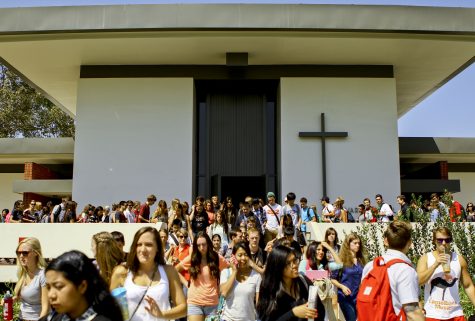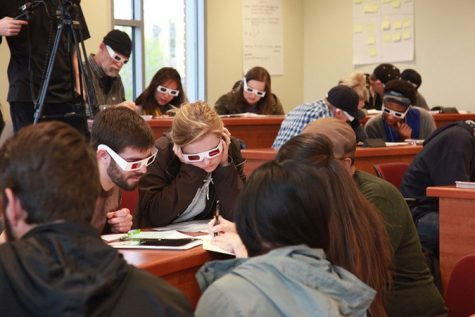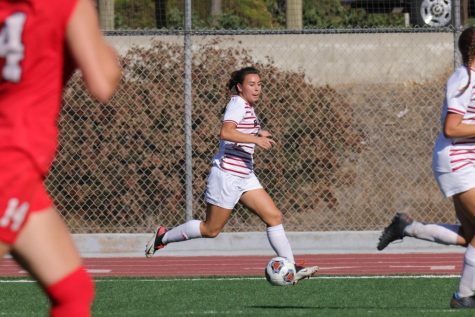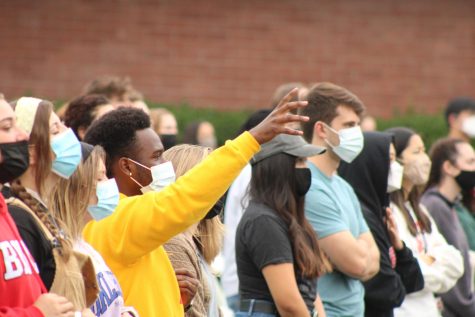Multi-ethnic films address hot topics
Glen Kinoshita, Multi-Ethnic Programs director is premiering “Human Tapestry,” a film about reconciliation.
November 11, 2010
He has no formal training in filmmaking, but creates and produces documentaries.
He speaks at national conferences focuse on diversity, and has always had a ministry goal in mind.
He began his career at Biola as an undergraduate student, and is passionate about the gospel of Jesus Christ.
He is Glen Kinoshita.
As director of the Multi-Ethnic Programs and producer of the film “Human Tapestry,” this unpracticed, yet passionate, filmmaker has a heart to see the gospel — the good news of reconciliation — proclaimed near and far.
Theme of reconciliation is a lifestyle
The theme of reconciliation, heard by students and faculty alike at the Torrey Conference just a few weeks ago, is expanded upon in “Human Tapestry.”
But for Kinoshita, this is not just a once-upon-a-time fairytale that will end just as quickly as it has begun. This is a lifestyle.
“Human Tapestry” is a collection of testimonies, stories and powerful poetry. Kinoshita has captured a picture of a seemingly “unmentionable” in many circles today, namely Christian schools and churches.
"Reconciliation is a divine mandate"
“Over the past couple years, Biola has been confronted with this issue through things like the Jesus Mural discussion and the recent Torrey Conference,” said Kinoshita. “Reconciliation is a divine mandate. Something Jesus did, the church in Acts did, and that is addressed in the epistles.”
A topic not often addressed by the western church, reconciliation — when studied — is seen as relevant to daily life. MEFP’s documentaries will be well worth the time of those whose hearts have been newly awakened to this topic.
“This is not so much a trend or a hot topic,” Kinoshita said. “This is woven into everyday life. It’s about being Christ-like.”
Past films also focus on reconciliation
“In Search of Shalom” was released in 2008. As a film focused on the white race and reconciliation, it consists of interviews with various people who describe themselves as feeling “cultureless” at times.
“This thought-provoking video highlights a series of candid interviews relating the fears, perplexities and hopes of white people on racial reconciliation,” said associate provost of Azusa Pacific University, Kimberly Denu. “In it, a powerful distinction is made between systemic and individual racism. This video is a must-see for Christian universities everywhere.”
In 2008, Kinoshita also released “Standing in the Gap: Student Voices in Reconciliation.” This film hones in on Christian college students, and allows viewers to hear what goes on in the minds of these students regarding diversity in education and faith.
Last year, in 2009, “Dawn in the Darkness” was released. With the majority of this film containing interviews with pastors and clips of sermon messages, Kinoshita uses the adjective “holistically” to describe the way Christians must understand the gospel and see the diversity of the world.
With a heart for reconciliation, Kinoshita knows this is where he is supposed to be. “It is about being who we are supposed to be and doing what we are supposed to do,” Kinoshita said. “This is why I continue to engage in the ministry of reconciliation. This is why I continue to produce documentary films.”
It is from this passion that he extends an invitation to the Biola community to see his newest film.
Theme of community impacts students
“It’s not just about hearing these stories,” Kinoshita said. “All of this has the goal of getting us to make it all more personal. It’s about learning to think about your story.”
The theme of community resounds daily on Biola’s campus, and as the hope of reconciliation continues to take precedence, Kinoshita and Multi-Ethnic Film Productions invite students and faculty to a viewing of “Human Tapestry” on Monday, Nov. 15, and Tuesday, Nov. 16 in the Caf Banquet Room from 12 p.m. to 1 p.m. as a “lunch and learn” event.
The film is in four parts, each 25 minutes long. Parts one and two will be shown Monday, and parts three and four on Tuesday. Trailers for each part can be seen here.






